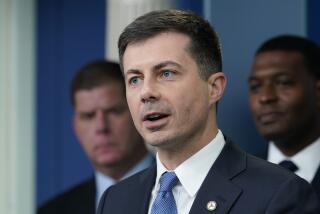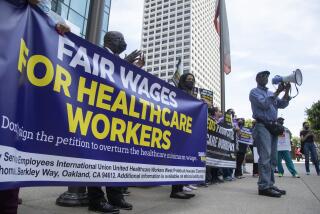Health Bill Financing Plan Clears Hurdle : Legislation: A GOP challenge to employer mandate is defeated in one Senate panel. U.S. Chamber of Commerce seeks pledges to vote against the idea.
- Share via
WASHINGTON — President Clinton’s plan requiring employers to pay the lion’s share of health care insurance costs cleared a first, small hurdle in the Senate Wednesday.
Democrats on the Senate Labor and Human Resources Committee fought off a Republican effort to delete the so-called employer mandate from the health care reform bill that the committee is drafting.
But despite the early demonstration of support for the mandate, it remained clear that the concept faces a steep uphill fight.
The more decisive Senate battleground will be the Finance Committee, where sources said Chairman Daniel Patrick Moynihan (D-N.Y.) is preparing to include the mandate in the first draft of his health care bill when he presents it to his committee today. Members there are sharply divided over the issue.
Meanwhile Wednesday, in a move designed to turn up the heat on the issue even further, the U.S. Chamber of Commerce launched a grass-roots campaign against the mandate, asking lawmakers to pledge in writing that they will not vote for it--or for any new business taxes--to pay for overhauling the health care system.
Senate Majority Leader George J. Mitchell (D-Me.) responded by releasing a letter from more than 1,300 organizations and businesses calling the employer mandate “a fair, effective and practical means for achieving universal coverage.”
The fate of the funding mechanism remains crucial to the Administration’s entire health reform effort. In the most controversial part of his bill, the President has proposed that--with some exceptions--employers should pay 80% of their employees’ health care premiums. Supporters of the concept say that it is the only way to meet Clinton’s most basic goal of assuring health care coverage for all Americans, while opponents insist that it will cripple or destroy thousands of small businesses.
The inability to reach some consensus on the issue has been the biggest stumbling block facing all five of the committees trying to write health reform legislation.
In the test of the mandate in the Senate Labor panel, Democrats won a 10-7 partisan vote to defeat a GOP proposal to eliminate the employer mandate.
But the committee also voted to go further than its chairman, Sen. Edward M. Kennedy (D-Mass.), or the President had suggested in easing the burden of the mandate on small businesses.
Clinton originally proposed giving government subsidies to small firms with low-paid workers to help them pay insurance premium costs. In a first draft of the bill, Kennedy went further by proposing to exempt businesses employing five or fewer workers from the mandate and requiring instead that they pay a 2% payroll tax.
An amendment by Sen. Jeff Bingaman (D-N.M.), approved, 11 to 6, Wednesday, exempts companies with as many as 10 workers and lowers the payroll tax to 1% for those with five or less.
Sen. James M. Jeffords (R-Vt.) joined Democrats in supporting Bingaman’s amendment. He is also the only Republican to support Clinton’s plan and is expected to be the only GOP member to vote for the committee bill.
Separately, sources said that Moynihan’s first draft of health reform legislation, known in the parlance of Capitol Hill as a “chairman’s mark,” would include an 80% employer mandate similar to Clinton’s, except that it would offer an exemption for the smallest businesses.
Moynihan’s apparent intentions came as a surprise to many, because he has been so openly skeptical of the Clinton approach.
In one explanation, observers contended that the chairman had grown tired of being portrayed as an obstacle to health reform and hoped to make it clear that he is ready to give the President’s bill a chance to pass. But that move almost certainly would mean abandoning his efforts to bring Republicans on board and wrestling to bring the committee’s fragile Democratic majority in line.
Across the Capitol, in an event loaded with symbolism, incoming House Ways and Means Chairman Sam Gibbons (D-Fla.) conducted his first caucus with committee Democrats since taking the helm of the panel from Rep. Dan Rostenkowski (D-Ill.). Under House Democratic rules, Rostenkowski was forced to step down after he was indicted last week on corruption charges.
Rostenkowski, who remains a member of the committee, attended the session called by Gibbons to discuss the health bill that he put forward Monday. “Sam’ll do the job,” Rostenkowski said.
The full Ways and Means Committee will meet today.
Times staff writer William J. Eaton contributed to this story.
More to Read
Get the L.A. Times Politics newsletter
Deeply reported insights into legislation, politics and policy from Sacramento, Washington and beyond. In your inbox twice per week.
You may occasionally receive promotional content from the Los Angeles Times.










